| ||||||||||||||||||||
| ||||||||||||||||||||
| ||||||||||||||||||||
The Tocantins gubernatorial election was held on October 3, 2010, to elect the next governor of Tocantins. Incumbent Governor Carlos Gaguim was running for his first full term, but lost narrowly to the PSDB's Siqueira Campos. [1]
| ||||||||||||||||||||
| ||||||||||||||||||||
| ||||||||||||||||||||
The Tocantins gubernatorial election was held on October 3, 2010, to elect the next governor of Tocantins. Incumbent Governor Carlos Gaguim was running for his first full term, but lost narrowly to the PSDB's Siqueira Campos. [1]
| Candidate | Running mate | Coalition [2] |
|---|---|---|
| Carlos Gaguim PMDB | Valderez Castelo Branco PT | |
| Siqueira Campos PSDB | João Oliveira DEM |
| Party | Candidate | Votes | % | ±% | |
|---|---|---|---|---|---|
| PSDB | Siqueira Campos | 349,592 | 50.52% | ||
| MDB | Carlos Gaguim (incumbent) | 342,429 | 49.48% | ||
| Majority | 7,163 | 1.04% | |||
| PSDB gain from MDB | Swing | ||||

The Tocantins River is a river in Brazil, the central fluvial artery of the country. In the Tupi language, its name means "toucan's beak". It runs from south to north for about 2,450 km (1,520 mi). While sometimes included in definitions of the Amazon basin, the Tocantins is not a branch of the Amazon River, since its waters flow into the Atlantic Ocean via an eastern channel of the Amazon Delta, alongside those of the Amazon proper. It flows through four Brazilian states and gives its name to one of Brazil's newest states, formed in 1988 from what was until then the northern portion of Goiás.

Tocantins is one of the 26 states of Brazil. It is the newest state, formed in 1988 and encompassing what had formerly been the northern two-fifths of the state of Goiás. Tocantins covers 277,620.91 square kilometres (107,190.03 sq mi) and had an estimated population of 1,496,880 in 2014. Construction of its capital, Palmas, began in 1989; most of the other cities in the state date to the Portuguese colonial period. With the exception of Araguaína, there are few other cities with a significant population in the state. The government has invested in a new capital, a major hydropower dam, railroads and related infrastructure to develop this primarily agricultural area. The state has 0.75% of the Brazilian population and is responsible for 0.5% of the Brazilian GDP.

Marabá is a municipality in the state of Pará, Brazil. Its greatest geographic reference is the confluence of two large rivers near the historic city center, the Itacaiunas River and the Tocantins River, forming a "Y" if seen from space. It basically consists of six urban centers linked by five highways.
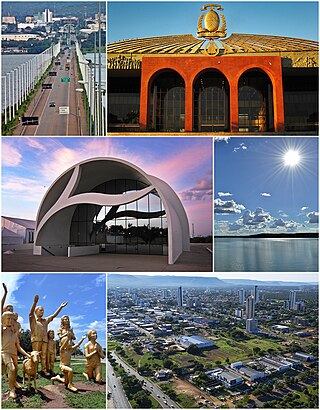
Palmas is the capital and largest city of the state of Tocantins, Brazil. According to IBGE estimates from 2020, the city had 306,296 inhabitants. Palmas has a metropolitan area with 471,639 inhabitants.
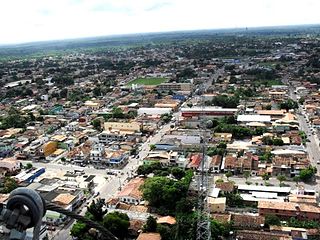
The city of Abaetetuba is located in Pará State, Brazil. The population of the municipality is 159,080. It is located in the northern region of Brazil and in the northeastern part of Pará, at a latitude of 01°43'05" south and longitude 48°52'57" west. It lies on the right bank of the Tocantins River mouth. Abaetetuba is the hub city of the Baixo Tocantins Region and the 6th most populous city in the state. The municipality consists of two districts: Abaetetuba (headquarters) and Beja.
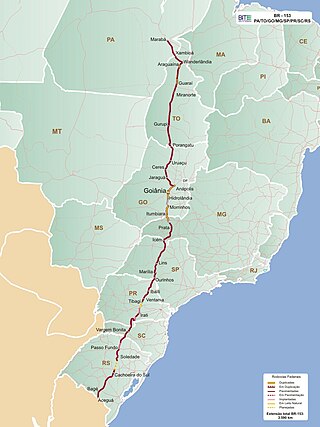
BR-153 is a major federal highway of Brazil, officially named the Transbrasiliana Highway. It also serves as part of the Belém–Brasília Highway in the stretch located between the cities of Wanderlândia, in the state of Tocantins, and Anápolis, in the state of Goiás.

RedeTV! is a Brazilian television network owned by Amilcare Dallevo and Marcelo de Carvalho. It is the newest television network, among the five major networks in Brazil, being a relaunch of Rede Manchete in 1999.
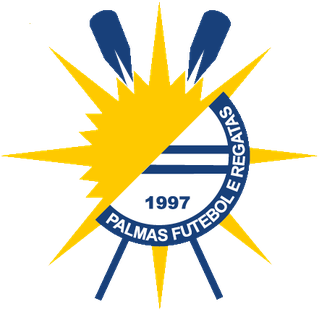
Palmas Futebol e Regatas, or Palmas, as they are usually called, is a Brazilian football team from Palmas in Tocantins, founded on 31 January 1997. It competes in the Campeonato Tocantinense, the top flight of the Tocantins state football league.

Santana do Araguaia is the southernmost city in the Brazilian state of Pará. The city lies near the Araguaia River, which marks the border with the state of Tocantins and Mato Grosso. The town was established on December 20, 1961, by then-governor of Pará, Aurélio do Carmo, after being split off from the municipality of Conceição do Araguaia.
Tabocão is a municipality in the state of Tocantins in the Northern region of Brazil.

Interporto Futebol Clube, or Interporto, as they are usually called, is a Brazilian football team from Porto Nacional in Tocantins, founded on 13 July 1990.
In 2012, the Campeonato Brasileiro Série D, the fourth division of the Brazilian League, was contested for the fourth time. Forty clubs competed, four of which eventually qualified for the Campeonato Brasileiro Série C to be contested in 2013.

Events from the year 2004 in Brazil.

Kátia Regina de Abreu is a Brazilian politician, serving as a Senator for Tocantins since 2007. She was previously elected as a congresswoman for Tocantins from 2003 to 2007. After her departure from the Democratic Labour Party in March 2020, Kátia joined the Progressistas.
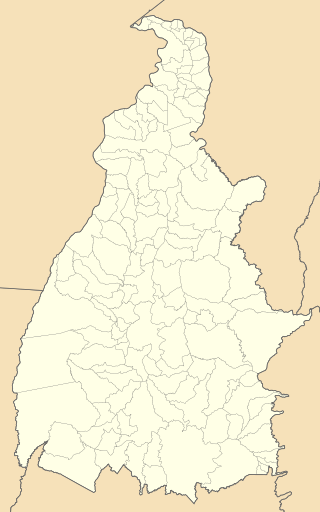
The Tocantins gubernatorial election was held on 5 October 2014 to elect the next governor of the state of Tocantins, Brazil. If no candidate had received more than 50% of the vote, a second-round runoff election would have been held on 26 October. Governor Sandoval Cardoso ran for his first full term after becoming governor in 2014, but lost to former Governor Marcelo Miranda in the first round.

Events in the year 2010 in Brazil.

The 2018 Tocantins gubernatorial special election was summoned by the Superior Electoral Court after the decision that removed the Governor and Vice Governor of Tocantins, who won the 2014 election, by the allegation of abuse of economic power. In the face of such sentence, the President of the Legislative Assembly, Mauro Carlesse, took office as Acting Governor until a new voting decided who would command the state government. Altogether, seven candidacies were registered for the election. Carlesse ran for Governor and defeated Senator Vicentinho Alves in the second round with more than 75% of the valid votes. The term of Carlesse ends on 1 January 2019, when the Governor-elect in the October election will take office.

Miss Tocantins is a Brazilian Beauty pageant which selects the representative for the State of Tocantins at the Miss Brazil contest. The pageant was created in 1989 and has been held every year since with the exception of 1990–1991, 1993, and 2020. The pageant is held annually with representation of several municipalities. Since 2021, the State director of Miss Tocantins is, Raffael Rodrigues. Tocantins has won only one crown in the national contest:

Wanderlei Barbosa Castro is a Brazilian businessman and politician who has been the governor of Tocantins since 2022, after the removal of then-governor Mauro Carlesse. Prior to being governor, he was vice-governor from 2018 to 2022 under Carlesse. He is currently a member of the Republicanos party.